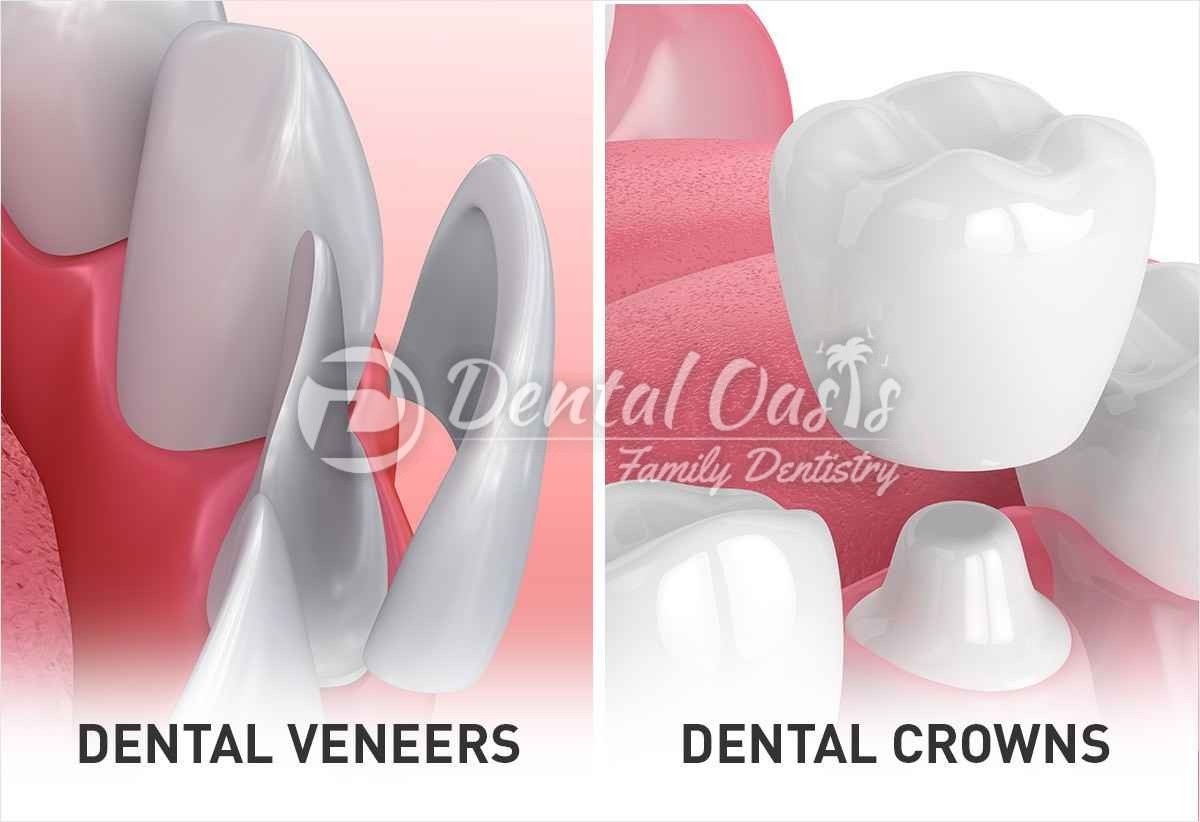Dental Veneers Vs Crowns: What is the difference and which treatment is best for you?

When it comes to dental restoration methods, two options stand out- dental veneers & crowns. It is important to know how they differ from each other as also what their individual pros & cons are for you to make an informed decision. While the difference that stands out is that veneers cover the front of your teeth while a crown covers the entire teeth, there are several other differences. Let us look at them in some detail.
Dental Veneers Vs Crowns
Simply put, a veneer is a thin layer either of porcelain or any other material that is bonded to the front of your tooth. A crown, on the other hand, is made up of porcelain, porcelain fused with a metal alloy, an all-metal alloy that is around 2 mm in thickness & covers your entire teeth.
Common conditions of the tooth that call for a restoration include:
- Teeth that are discolored
- Teeth that are chipped
- Decayed teeth
- Crooked Teeth
The advantage that both crown & veneers offer is that they can be matched to the color of your teeth, making their presence not stand out.
What is a veneer?
While a dental veneer covers only the front surface of the tooth, the big advantage it offers is that it isn’t as invasive as a crown. All the dentist needs to do is ground down half a millimeter of the enamel on the front of the tooth so that it bonds easily with the veneer. The steps involved in a veneer include:
- Making an impression of your tooth to be able to customize the veneer
- Once the customized veneer is received it is bonded to the tooth with a special cement
- Ultraviolet light is next used to harden it
- In case you are prone to grinding your teeth at night, it will work well to wear a night guard to protect the veneer
YOU MAY ALSO LIKE: Veneers Cost
What is a crown?
Since a dental crown covers the entire tooth, the process is more invasive as it is required to grind down a larger portion of the tooth. In case of any tooth decay, it is important to remove the decayed part before the crown is put.
The steps involved in placing a crown include:
- Taking an impression of your tooth
- On receipt of the customized crown, it is put into place in a manner so that your bite is right.
- The crown is then cemented in place
What works better a veneer or a crown?
While a qualified dentist will be in the best position to make the decision for you, the thumb rule largely is that if the tooth has a large filling, or if the tooth is worn or cracked, a crown works well. On the other hand, if the tooth doesn’t have any serious issues and the restoration is largely for cosmetic purposes, a veneer works well. Additionally, if you are looking for small shape corrections of the tooth, veneers can be of help.
Cost
In terms of cost, the cost of both crowns & veneers will depend on a wide range of factors including but not limited to the size of your tooth, where it is located in your mouth and more. It is important to check your individual dental insurance cover to see if they cover the cost of veneers & crowns
To Sum Up
To sum up, let us look at the pros & cons of veneers & crowns to enable you to come to a decision. It is obvious, however, that a dental professional may be in the best place to advise you of the right option:
Pros of Dental Veneers
The big advantages of veneers include:
- They are aesthetically pleasing. In fact, as opposed to crowns they do not reveal gum margins.
- Since the grinding down in their case isn’t too much, you tend to retain a large part of your healthy tooth.
Cons of Dental Veneers
- Since they leave a large part of the tooth exposed, there is the possibility of new decay.
- They need to be replaced after a few years depending on the material used
- Veneers aren’t reversible
- In many cases they aren’t covered by dental insurance.
Pros of Crowns
- Since they cover a large part of your tooth, the tooth is protected from decay.
- They look like your natural teeth
- They are relatively permanent
- Dental insurance often covers a part of the cost of a crown.
Cons of a Crown
- A substantial portion of the natural tooth needs to be removed in order to place the crown
- In the initial days the crowned tooth is more sensitive to heat & cold
- If porcelain is used, it can damage over time
- If porcelain is fused with a metal alloy, the crown is often visible.
So, while both veneers & crowns come with their own set of advantages & disadvantages, you need to choose the option that works for your bespoke needs. Veneers work well for cosmetic improvement while crowns work well when the tooth has undergone decay or chipping.
Whether you opt for a veneer or a crown it is imperative that you maintain appropriate dental hygiene. This will protect not just the veneer or the crown but also the rest of the healthy teeth & reduce the need for further restorations.
With years of experience in dental care services, our dentist offers you a hassle-free experience when it comes to dental veneers and dental crowns. If you are looking to improve your smile instantly, call us at 925 846 4491 or email us at office@dentaloasispleasanton.com




